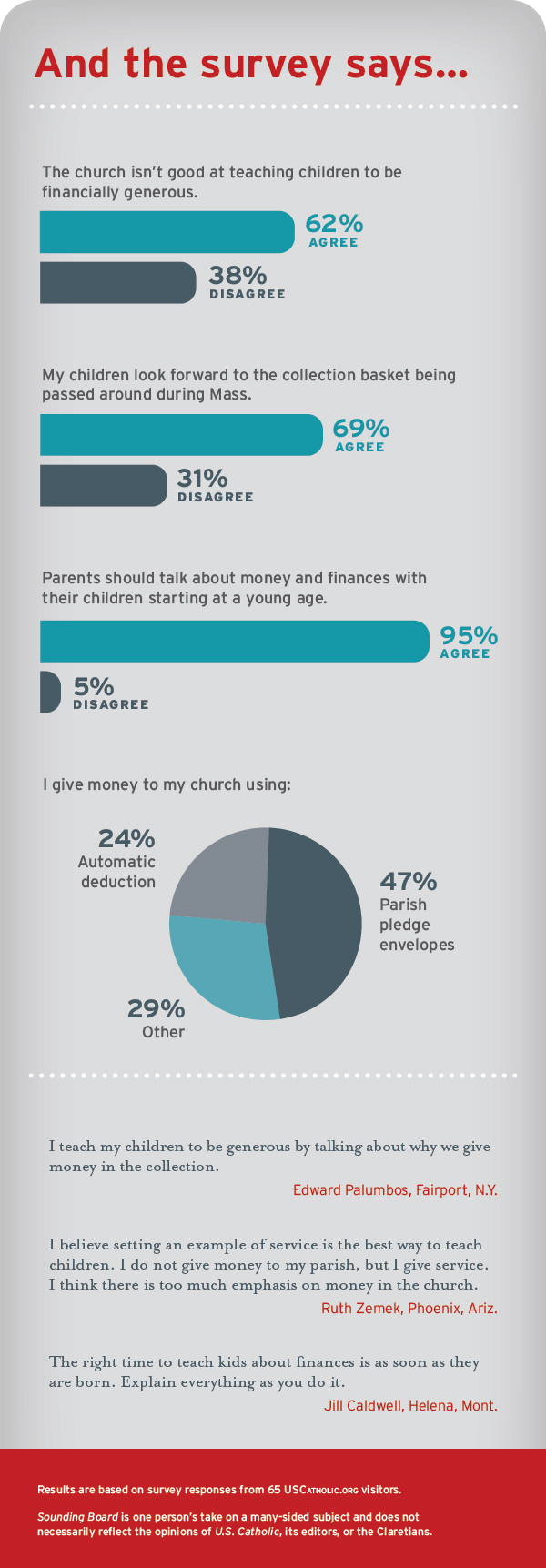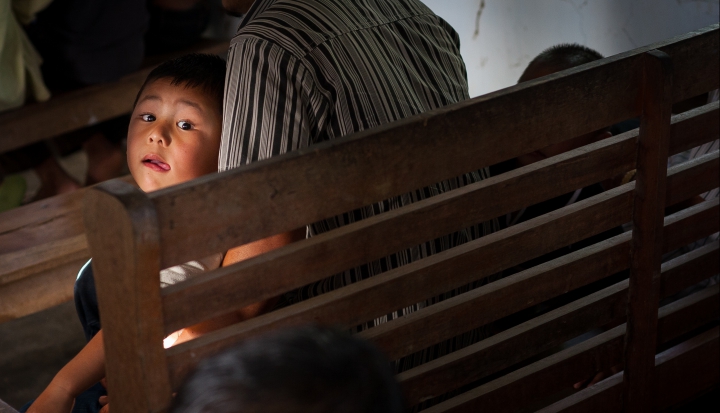This year I did something I swore I would never do: I ditched the parish pledge envelopes and signed up for automatic deduction.
For years I had been committed to the envelope system. Just as prayer, song, scripture, and the Eucharist are expressions of our relationship with God, so is giving, the act of sharing the fruits of my family’s labor. And that is something to be reminded of every week as we gather with our church community. To me, those envelopes were as sacred as the holy water I dip my fingers into when I enter the church. To have money withdrawn from my account and deposited directly in the church’s without so much as an “amen” just felt a little too much like omitting the gospel reading or skipping the Lord’s Prayer.
But the weekly ritual of frantically searching for the checkbook before church, rummaging around in my bag for a pen, and quickly scrawling out a check before the offering plate made its way to our pew was no match for the convenience of automatic checking. Too many weeks had gone by with the checkbook sitting on the desk at home or forgotten in the car. Since making the switch, our giving has been consistent, no doubt a positive change for our parish’s budget. And I no longer have to worry about whether a check has been cashed or if I should double or triple the amount we’d budgeted to make up for missed weeks.
Then there was a new development in my family. My son started to ask us about money, specifically whether we had it, could give it to him, or would use it to buy him a Build-A-Bear. At 3 and a half, his little world keeps expanding, and now he’s ever more aware that money is how you get things.
But money is also how you give things to others. And almost immediately after ditching the envelopes, I realized my son would no longer see us depositing our money into the offering plate. Each week that wide brass plate skipped our pew, it was as if an opportunity—to model the importance of financial stewardship—was passing us by.
As a church, we tend to do a lot better when it comes to teaching kids how to pray and listen to the stories of the Bible. We even teach them how to participate in the liturgy: how and when to kneel and sing “Alleluia.” But we don’t always do a great job of teaching children how to be generous. I’ve looked at some kid-focused curriculum on stewardship—mostly from Protestant church groups—and even they tend to focus on the idea of giving time, talent, and treasure, with a de-emphasis on treasure. Teaching kids financial stewardship in most churches seems to be secondary to prayer, scripture, and the sacraments, if not an afterthought altogether.
Maybe this is because most kids don’t have their own money. But that’s not a good reason to avoid talking to them about it, modeling financial stewardship, and offering them opportunities to engage with it themselves.
I want my son to learn to give freely because I want him to learn that life itself is a gift from God. We are not made dominions over the earth but stewards. And our stewardship includes not only the trees, the soil, and the rivers and streams but our money as well. Everything belongs to God, something scripture teaches us and is repeatedly echoed by Pope Francis. When we give generously, we learn how to be more open to the presence of God. Sharing these gifts is a prayerful act that reminds us of God’s bounty and one in which children should be invited to share.
But how could I even begin this lesson without those pesky envelopes? I started by talking to my son openly and honestly about money, something we could all do a little more of, no matter how young or old we are.
When my son accompanies me on a trip to Target or the grocery store, I get asked a lot of questions. Why? How? What’s that? When is. . . ? Where is. . . ? And, of course: Will you buy that for me? Instead of just responding “no,” as was my custom, now I remind him that buying things requires money, and I only brought enough money to buy the things on my list.
At 3, I don’t expect my son to grasp the concept of sacrifice. He doesn’t even grasp the concept of concept, according to my most-consulted parenting book. But I think older children should learn about how a family sacrifices some of their wants in order to give to the needs of others. What better place to have that conversation than the toy aisle, surrounded by shelf after shelf of wants? We ought to show our children that money
matters and that to have money is to have responsibility. Sharing our wealth is part of who we are as Christians.
Sunday liturgy is an excellent opportunity for parents and caretakers to model generosity. Even though my family no longer drops an envelope in the offering plate each week, I point it out to my son. “This is when we give money to the church,” I say. “Mama and Papa gave their money before church.” (It’s the best I’ve been able to come up with since he doesn’t exactly understand the term electronic funds withdrawal just yet.)
After a few weeks of talking about the offering plate, I gave him an opportunity to give by slipping him a dollar bill from my purse. He loved this, but I’ve since started to hand him a dollar before we even leave for church. I tell him to keep it safe in his pocket and that he can give it away when the plate comes around. I use that language: “You can give it away.” So far he hasn’t opted to hold on to the money. Good kid.
When he’s a little older, we plan to give him 10 cents every day he feeds the cats. He can put the money in a jar, and instead of handing him a dollar before church, we’ll ask him how many of his coins he’d like to give away.
Of course, I do not expect my young son to fully understand finances. But didn’t I whisper in his ear how much I love him when he was but days old? Or softly chide “no no” when he’d reach out to touch an electrical socket at nine months? The best lessons start young. I hope that our family’s practice of financial giving helps him to understand one of the deepest truths we believe: that God is generous and so should we be. We think it’s already taking hold. He frequently reminds us, “Sharing is caring.” And I no longer have to find a place to store a box of envelopes.

This article also appears in the April 2018 issue of U.S. Catholic (Vol. 83, No. 4, pages 20–23).
Image: Flickr cc via Jake Guild














Add comment